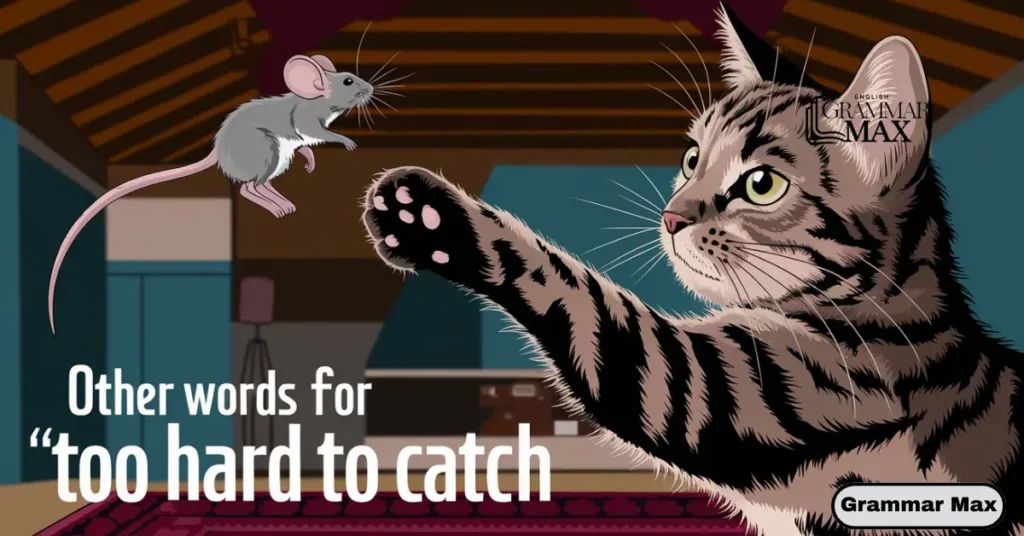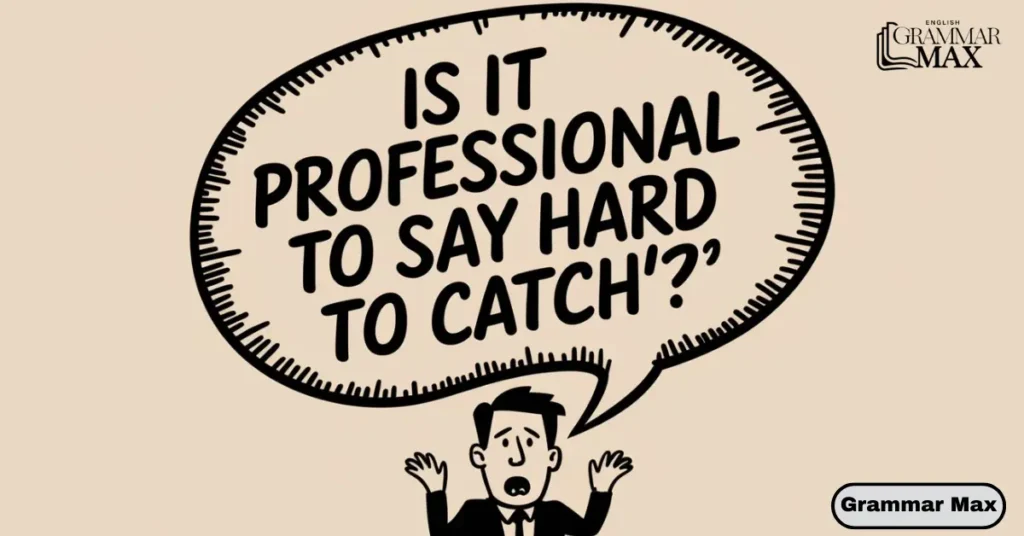Too hard to catch often describes elusive or unattainable things, situations, or people. Sometimes, a task feels as elusive as a shadow or someone behaves like catching the wind, always just out of reach. Whether in daily conversation, professional settings, or creative writing, we often need the right words to capture the sensation of the ungraspable.
These 30 expressions provide a wide range of phrases to convey an elusive nature, ideal for personal or workplace scenarios. Let’s explore these vivid expressions to better communicate the subtleties of things that escape capture.
Other Words For “Too Hard to Catch”

You can use these words instead to say “Too Hard to Catch”:
- Elusive as a Shadow
- Slippery as an Eel
- Like Catching the Wind
- A Moving Target
- Escaping Like a Wisp of Smoke
- Slipping Through the Cracks
- A Needle in a Haystack
- Beyond Grasp
- Fading into the Background
- Houdini-like Evasion
- Out of Reach
- Hard to Pin Down
- Fleeting
- Intangible
- Escaping Notice
- Vanishing
- Phantom-like
- Vapor-like
- Uncontainable
- Out of Sight
- Hard to Grasp
- Disappearing
- Unattainable
- Hard to Locate
- Shifty
- Unreachable
- Dodging
- Shadowy
- Subtle and Ambiguous
- Fugitive
Elusive as a Shadow
This phrase captures the nature of something constantly out of reach, slipping away whenever you get close. Like a shadow, it’s always there but never fully attainable.
Example: “Understanding the root cause of this issue has been as elusive as a shadow we’re always one step behind.”
Slippery as an Eel
Describes a situation or person who is hard to hold onto, slipping through attempts to manage or catch them. Much like an eel, they wriggle away, making it difficult to pin down specifics.
Example: “Getting concrete details from him is slippery as an eel always evasive and never quite straightforward.”
Like Catching the Wind
Reflects the frustration of chasing something intangible, like the wind, which is impossible to hold onto. The phrase often highlights a challenging pursuit that feels almost futile.
Example: “Extracting a clear plan from this feedback session was like catching the wind; every answer shifted and changed.”
A Moving Target
Used to describe something that’s constantly changing, making it difficult to keep up or achieve. Goals, timelines, or expectations shift unpredictably, requiring frequent adjustments.
Example: “Completing this project has felt like hitting a moving target with new requirements every day.”
Escaping Like a Wisp of Smoke
Conveys how something or someone disappears as soon as you get close, like smoke dispersing in the air. The phrase implies an elusive quality that leaves no trace.
Example: “Securing a firm commitment from them has been escaping like a wisp of smoke gone the moment we think we have it.”
Slipping Through the Cracks
Refers to something that’s overlooked or missed due to distractions or busy schedules. Important tasks or details can often be missed unintentionally.
Example: “Several small but essential items have been slipping through the cracks during our rush to meet deadlines.”
A Needle in a Haystack
Used when something is extremely difficult to locate, buried among countless other things. The phrase captures the overwhelming challenge of finding one specific item in a vast field.
Example: “Finding the right file from last year’s archive is like finding a needle in a haystack with our current resources.”
Beyond Grasp
Implies that something is almost within reach but remains just out of reach despite best efforts. It’s something that feels frustratingly close but is unattainable.
Example: “Meeting this quarter’s ambitious sales target seems just beyond grasp, even with our best efforts.”
Fading into the Background
This phrase highlights something that gradually becomes unnoticeable, often overshadowed by more pressing tasks. Over time, it’s easily overlooked or deprioritized.
Example: “Some of the smaller tasks have been fading into the background while we focus on urgent deadlines.”
Houdini-like Evasion
Describes a clever, almost magical escape, much like the famous magician Harry Houdini. Often used for people or tasks that seem to disappear just as you try to tackle them.
Example: “Securing time with our busy manager has required nearly Houdini-like evasion on his part.”
Out of Reach
Implies that something is physically or metaphorically unreachable, often beyond realistic possibility. It can relate to goals, people, or objectives.
Example: “Finalizing the report by Friday seems completely out of reach given our current workload.”
Hard to Pin Down
This describes something that’s difficult to understand or get clear answers on, constantly shifting or elusive. It implies that something cannot easily be settled or finalized.
Example: “His feedback was hard to pin down, with changing opinions and unclear instructions.”
Fleeting
Describes something that’s temporary, here one moment and gone the next. Fleeting things don’t last long, making them hard to grasp or hold onto.
Example: “Our chance to discuss changes with the team was fleeting, gone before we knew it.”
Is it Professional to Say “Too Hard to Catch”?

Describing someone or something as “too hard to catch” can convey that it’s difficult to reach, obtain, or pin down, but it’s essential to consider the context. This phrase may appear informal or even slightly dismissive in a business context, especially if clarity and precision are required. Instead, consider using alternatives like “challenging to reach”, “difficult to secure”, or “elusive” to maintain a respectful and professional tone.
Frequently Asked Questions
What is a word for too hard to catch?
A word for “too hard to catch” is “elusive”, which describes something that’s challenging to find, reach, or capture due to its slippery or evasive nature.
What does “difficult to catch” mean?
“Difficult to catch” refers to something that’s hard to obtain or secure because it continually slips out of reach or avoids being captured.
What is a word for hard to grasp?
A word for “hard to grasp” is “intangible”, which means something that’s difficult to understand, define, or hold onto mentally or physically.
What is the adjective of hard to catch?
The adjective for “hard to catch” is “evasive”, describing someone or something that avoids capture or is intentionally elusive.
Conclusion
Things that feel too hard to catch are all around us, from elusive ideas to shifting goals. Each phrase above adds depth and dimension, helping us describe those things in a way that captures their evasive nature.
Whether using elusive as a shadow or like catching the wind, these expressions enrich communication. They offer new perspectives on situations that resist capture, reminding us that even when things feel out of reach, words have the power to bring them within our grasp.

William Henry is a writer for Grammar Max, a blog that focuses on synonyms and phrases. He loves exploring the quirks of the English language and enjoys helping readers improve their vocabulary. William’s articles are easy to read, fun, and full of useful tips for anyone looking to better understand and use English. Whether you’re a student, a professional, or just someone interested in language, William’s writing on Grammar Max makes learning about words and their meanings simple and enjoyable.
